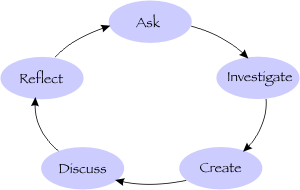
Photo courtesy of John Dewey, The Inquiry Page (2010). Retrieved from: http://www.cii.illinois.edu/InquiryPage/
(Philosophy Link: Allow time for both the students and yourself as a teacher to reflect)
Being a part of the self-regulated learners cohort at UBC, I have come to know of the significance of reflection. Allowing for time after something has taken place in a classroom or concluding a day at school greatly favours the development of the life-long learner behavior.
In order to engage the students in metacognition it was suggestible that I had the students reflect on the lesson that had just taken place. This would usually be in the form of an exit slip or a short journal entry just to solidify what had previously taken place. Journal entry questions would often include reflective questions such as “what did you find difficult from to day?” or “what was one piece of information that you thought was valuable from today and why?”
It is of the utmost importance that this eventually develops a self-regulating mechanism within the students themselves. To make sure of this I would often challenge the students to compare lessons and see of they could come up with things that they would change or do more of within their reflections. These comments would then help serve my own reflective processes as I could take a step back and read what the students thought went well and what did not.
Reflection can also come in the form of being self-aware of one’s learning. For example during the spring months of my practicum I would start to include a pause in the lesson to ask the students if they thought the classroom was becoming too hot to focus. The student would then vote if they thought they were able to continue on or take a short break outside to get some fresh air. I found that the students being self-aware of their own state of mind had a tremendous impact on their learning. This was especially apparent when they would determine whether or not they thought they were getting enough out of the lesson content due to being exhausted from the heat. If it was in fact too hot, the break would provide time for the students to refocus and reenergize before getting back to finishing the lesson.
The link below is another example that I used to have the students reflect during a lesson with our Government unit. The students had to reflect on what type of Government they had just watched from a skit acted out by some of their peers. This engaged the students in reflective and critical analyzation processes in order to determine the style of Government being portrayed.
